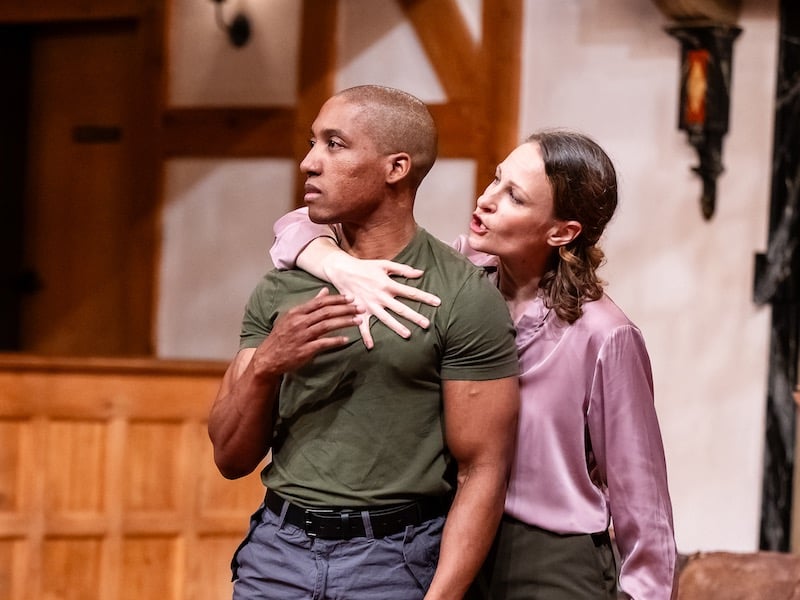In these turbulent times, when rumors fly across the ether in nanoseconds and paranoia reigns supreme, when some stare at the abyss, waiting for the crack of doom, it is well worth our time to contemplate how Shakespeare dealt with the dark night of a nation’s soul. Director José Zayas has created a Macbeth for our moment at the American Shakespeare Center, and for all its spectacle and poetry, its heart is as gritty and grimy as a tale of regicide, and ghostly revenge, can be.
The tragedy of Macbeth has become a cornerstone in the Shakespearian repertoire, not least because of its relevance to the cut-throat politics that spills into our eyes every time we open our phones. A friend invites you for tea, and spikes it with a deadly poison; another one stabs you in the back, or worse, in the face. Millions fall in line behind a corrupt and shamelessly violent leader, for reasons as self-serving as they are cowardly. Such is the bond of “trust” that defines politics in so many parts of our world.

Anchoring this production is K.P. Powell’s turn as the Dark Scot. His Macbeth is one who is ultimately ripe for regicide, and not that much beholden to his wife; I’ve seen productions where the motivation to murder Duncan is reduced to sexual seduction; when that happens, the play has suffered accordingly. But here Powell sees what’s possible, and embraces the murder and mayhem after a little persuasion from Lady Macbeth (the steely but vulnerable Leah Gabriel). The deed done, Powell’s panic at the ghostly consequences of his string of murders — Duncan, of course, being only his first victim — is as visceral and panic-stricken as I have ever seen.
Representing the better half of Scotland’s soul, Kenn Hopkins Jr. comes into his own as Banquo, and this loyal officer’s reflections on the chaos around him, and on his friend’s sudden rise to the throne, are among his best work. As Duncan’s son (and heir) Malcolm, Summer England provides the assured, calm center around which the chaos spins. Her steady hand and sober demeanor give us the confidence and conscience that is sorely lacking elsewhere.
There is some spectacle, and eerie sounds, to accompany the action. A mud-and-stone rampart, with trash and human remains embedded in it, whirls around from one scene to the next, reinforcing the primitive and bloody nature of the play. Speeches are punctuated by the mournful tones of a cello, and the space is haunted by a metallic, bowed contraption that will set you on edge the minute unseen hands begin to play it backstage. Strategic whispers, scarcely heard, add to the paranoia at the heart of this production’s soundscape.
But the greatest spectacle by far is that of the Weird Sisters, the three spirits who, knowing Macbeth’s nature, also know that he shall be king, but that his reign will not last long. Leah Gabriel, Aidan O’Reilly, and Sara Linares don huge grotesque masks and shrouds, to reinforce their nature as supernatural beings whose knowledge of the future is absolute — but whose willingness to express it is frustratingly cryptic.
Productions with small casts call for great versatility among the supporting cast; Sara Linares and Angela Iannone split their personalities to splinters, and with great results — Linares is especially affecting as Banquo’s son Fleance, while Iannone’s King Duncan has all the gravitas you might expect from such a seasoned performer; her Porter, meanwhile, offers a darker side to what is often treated as a comic routine (some of the Porter’s more comic bits are deliberately cut here).

Audiences familiar with the play will notice a number of strategic cuts to the script — which are offset by Zayas’ insertion of pauses, moments that suspend the action at especially poignant moments. Banquo’s murder is followed immediately by his “adoption” by the witches, and the restless dead wander the stage to remarkable effect — Gabriel’s Lady Macbeth’s ghostly presence, after her suicide, is especially moving. The story remains intact, but there is more to contemplate here, precisely because the pauses give us opportunities to reflect.
The action comes to a head as MacDuff — played here with a towering passion by Aidan O’Reilly — readies for a final battle with Macbeth. The production being in modern dress, there is no need for the traditional Medieval broadswords; Fight Directors Colleen Kelly and J.P. Scheidler have crafted an intensely physical knife-fight, with good and evil pitted against each other at dangerously close quarters, as if in a dark alley. For fans of well-conceived and finely done stage combat, this is an absolute must.
The songs, as is so often the case, match the mood of the play so well that they seem an obvious natural fit. There were the oldies but goodies — Creedence Clearwater Revival’s “Bad Moon Rising” and Donovan’s “Season of the Witch” — and more contemporary takes on haunting (Shakey Graves’ “Dearly Departed” and “Kingdom Come” by The Civil Wars). Britt Michael Gordon, who also makes a fine turn as Ross, adds nicely to the musical repertoire here, and his whistling talents are worth the listen.
This dark, haunting tragedy will soon be in repertory with Oscar Wilde’s classic comedy The Importance of Being Earnest, so rest assured that when you’ve had your fill of gloom and doom one night, you can still laugh at yourself the next.
Running Time: Two hours and 15 minutes, including one intermission.
Macbeth plays through November 23, 2024, (in repertory with The Importance of Being Ernest from July 25 to October 20, The Merry Wives of Windsor from September 12 to November 23, and Dracula: A Comedy of Terrors from October 17 to November 24) presented by American Shakespeare Center at the Blackfriars Playhouse, 10 South Market Street, Staunton, VA. For tickets ($28–$73), call the box office at (540) 851-3400, or purchase them online.
Cast and artistic team credits for Macbeth are online here (scroll down).
SEE ALSO:
Wickedly funny ‘Importance of Being Earnest’ at American Shakespeare Center (review by Andrew Walker White, August 1, 2024)



